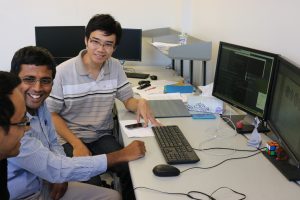In today’s technology-driven world, the need to have information instantaneously is growing. Big data can be of large “volume,” meaning the number of bytes required to store the data, as well as high “velocity,” or a high rate of change. The field of analyzing such massive, fast-changing data is called “streaming analytics.”
Iowa State University Department of Electrical and Computer Engineering (ECpE) Kingland Professor Srikanta Tirthapura, is working on ways to ways to handle higher data rates and decrease turnaround time for streaming analytics.

Tirthapura recently won an award from the Division of Computing and Communication Foundations (CCF) of the National Science Foundation (NSF) for his project titled “Multicore to Wide Area Analytics on Streaming Data.” The award is for $308,000 over the next three years.
This project creates methods for analyzing massive streaming data on computing systems, ranging from machines with multiple cores sharing memory to geo-distributed data centers communicating over wide-area networks. When a large data set of the order of hundreds of gigabytes changes due to the arrival of new data, instead of having to recompute patterns in data from scratch, these new algorithms will elicit the new patterns in a more incremental manner. The results of this project will impact fields that use large-scale machine learning and graph analytics, including cybersecurity, social network analysis and transportation.
Tirthapura said his incremental approach can drastically speed up large-scale data analytics.
“In the absence of an incremental method, even with a cluster of computers, it can take hours to (re)-process large data of hundreds of gigabytes,” Tirthapura said. “We want to meet the needs of applications that require changes to be processed in the order of minutes.”
One of the challenges Tirthapura’s team faces is the variety of parallel computing hardware available today, ranging from shared-memory central processing units (CPUs), to graphic processing units (GPUs) to networked clusters. They are trying to determine how one design solution can be specialized to work with current systems, yet be generic enough to be relevant for future models. He said he believes his research team of graduate students and collaborators at Carnegie Mellon University have promising approaches to a solution.
Tirthapura plans to use the money from the award to keep his graduate students and pay for their research and time.
“I owe it all to the people I work with,” Tirthapura said. “My research collaborators, as well as the people I meet on a daily basis — they make the work exciting.”